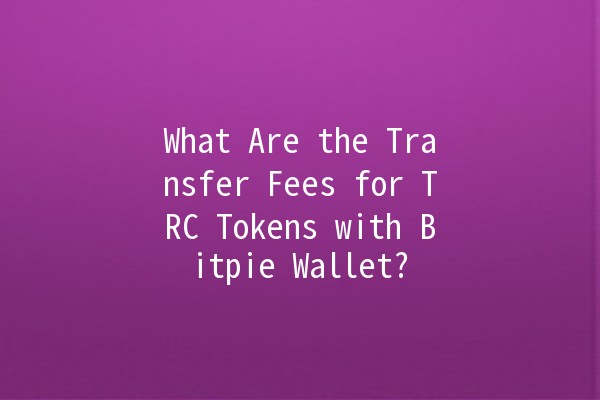
In the everevolving landscape of cryptocurrency, understanding the mechanics of digital wallets is crucial for both new and experienced users. One important aspect to consider is the transaction fees associated with transferring tokens, particularly when using dedicated platforms like the Bitpie Wallet for TRC (TRON) tokens. In this article, we’ll delve into the specifics of what those fees are, how they are calculated, and the strategies you can employ to efficiently manage your transactions while maximizing your profits in the decentralized world of cryptocurrencies.
Understanding Bitpie Wallet and TRC Tokens
Overview of Bitpie Wallet
Bitpie Wallet has gained recognition for its userfriendly interface and robust security features, making it a popular choice for managing a variety of cryptocurrencies, including TRC tokens. By choosing Bitpie, users benefit from a noncustodial wallet solution, meaning they maintain complete control over their private keys and funds. This level of autonomy is paramount in today's digital finance environment.
What Are TRC Tokens?

TRC tokens are a type of cryptocurrency that is built on the TRON blockchain. Known for its high throughput and low latency, TRON has become a favored platform for developers looking to create decentralized applications (dApps) and tokens. With an increasing number of projects being launched on the network, TRC tokens are becoming more prevalent in the crypto marketplace.
The Importance of Transaction Fees
Transaction fees are a necessary component when it comes to transferring cryptocurrencies. They serve multiple purposes, such as incentivizing miners or validators to process transactions, preventing spam attacks, and ensuring that users prioritize their transactions based on urgency.
Transaction Fees Structure for TRC Tokens on Bitpie Wallet
When transferring TRC tokens using the Bitpie Wallet, it is essential to be aware of the associated transfer fees. The fees can vary based on several factors, including network congestion and the amount being transferred. However, the Bitpie Wallet generally maintains competitive fees compared to other wallets. Below we break down the fee structure:
Fixed Fees: Bitpie may charge a standard fixed fee for each TRC token transaction, which provides predictability for users.
Variable Fees: In times of high network congestion, fees might increase. This is due to greater demand for transaction processing.
Minimum Balance Requirements: Some wallets may require users to maintain a minimum token balance to cover transaction fees.
Example of Average Transfer Fees
As of recent data, the average transaction fee for transferring TRC tokens using Bitpie Wallet is approximately 15 TRX (the native cryptocurrency of the TRON blockchain). However, these fees can fluctuate based on network conditions.
Tips for Reducing Transfer Fees
Managing transaction costs effectively is crucial for maximizing your overall gains in trading or holding cryptocurrency. Here are some essential productivityenhancing tips to help reduce transfer fees:
By timing your transactions during offpeak hours when the network is less congested, you can minimize the fees. Observing the network activity can help you identify optimal times for transactions.
Implementation Example: If you notice that most transfers occur over the weekends, consider scheduling your transactions early on Mondays or during latenight hours.
Bitpie Wallet often provides options that allow users to customize their transaction fees. Selecting a lower fee option can result in slightly longer transaction times but save on costs.
Implementation Example: When transferring TRC tokens, opt for the lowest priority option if the transfer is not timesensitive.
If possible, consolidate smaller transactions into one larger transfer. This method reduces the total fees incurred as you will only pay for one transaction.
Implementation Example: Instead of transferring 5 separate transactions of 100 TRC each, combine them into one transaction of 500 TRC.
Often, the fees may change based on upgrades or changes within the TRON network. Staying updated on these developments can inform you when to perform transactions.
Implementation Example: Follow TRON’s official channels or credible cryptocurrency news platforms to stay abreast of changes that could impact transaction fees.
Incorporating transaction fees into your overall cryptocurrency budget can help in managing expenses effectively. This practice allows for a more thoughtful approach to frequent transactions.
Implementation Example: Set aside a small percentage of your asset base specifically for transaction fees, ensuring you always have enough to cover multiple transfers.
Frequently Asked Questions
Transfer fees can be influenced by several factors, including network congestion, the size of the transaction, and the wallet provider's fee structure. During peak times, fees can spike due to increased demand.
Generally, Bitpie Wallet is transparent about its fee structure. However, users should be attentive to potential exchange fees if converting currencies within the wallet, which might not be as clearly stated.
Yes, Bitpie Wallet provides a transaction history feature where users can view past transactions, including detailed information on the fees incurred.
If you are facing high fees, you can either delay the transaction until network congestion decreases or adjust your fee settings to choose a lower priority option.
Yes, Bitpie Wallet is known for its security protocols. Being a noncustodial wallet, users retain control of their private keys, which enhances overall security.
Consider consolidating transactions, using lowfee options available within the wallet, or sending during less busy times to facilitate faster processing while minimizing costs.
By understanding transaction fees and employing these strategies, users can maximize their experience with TRC tokens on the Bitpie Wallet, ensuring that their transactions remain efficient and costeffective in the fastpaced world of cryptocurrency. Stay informed and proactive to navigate this complex yet rewarding landscape successfully.

